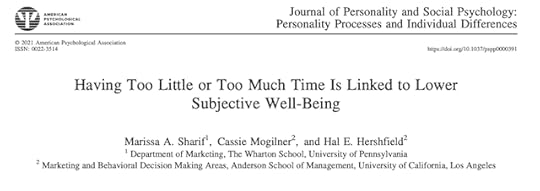On the Source of Our Drive to Get Things Done

In a recent essay for the New Yorker, I take a closer look at the growing popular dissatisfaction with the concept of “productivity,” a trend I underscore, in part, by citing some of the comments from readers of this newsletter.
In my piece, I focus on the precise economic definition of this term, which measures the output produced from a fixed amount of input. I argue that many knowledge workers resent the fact that the responsibility for maximizing this notion of productivity has been put solely on their shoulders. In the context of office work, I claim, the decision to make productivity personal has been largely negative.
There is, however, another definition of this term that I didn’t discuss in my New Yorker piece, but which is also worth investigating: its colloquial interpretation as a tendency toward activity and measurable accomplishment.
I increasingly encounter a strain of critique that dismisses this interpretation as an example of false class consciousness, arguing that we strive toward arbitrary fitness goals, or feel compelled to carefully document a dinner on Instagram, or race to finish reading the latest hot novel, because we’ve internalized a culture of production designed to ultimately help the capitalists exploit our labor. Or something like that.
Here I think reality is way more interesting and complex. Consider, for example, a paper published earlier this month in the Journal of Personality and Social Psychology, written by Marissa Sharif, Cassie Mogliner and Hal Hershfiled, and titled: “Having Too Little or Too Much Time is Linked to Lower Subjective Well-Being.”
This paper reports on the analysis of two large-scale time use data sets spanning over 35,000 Americans, and find that while it’s true, as expected, that having too little discretionary time lowers subjective well-being, the same unhappiness is also shown for having too much.
As the authors write:
“Having an abundance of discretionary time is sometimes even linked to lower subjective well-being because of a lacking sense of productivity. In such cases, the negative effect of having too much discretionary time can be attenuated when people spend this time on productive activities.”
Contrary to the critical assumption that the drive to produce is primarily culturally mediated, these results hint at something that many feel intuitively: there’s something deeply human, and therefore deeply satisfying, about succeeding in making one’s intentions manifest concretely in the world.
At the same time, of course, we also feel intuitively that when we subvert this drive by putting onto our proverbial plates more than we can possibly conceive of accomplishing, the resulting sense of overload leaves us deeply unhappy.
The allure of productivity is therefore a complex one. We cannot dismiss it as the result of the evil master plan of mustache twirling capitalists. We also cannot embrace it as an unalloyed good. It’s a human drive tangled with the contradictory imperatives of culture.
Which is all to say, our relationship to productivity is a topic that certainly requires some more careful examination.
#####
(It’s here that I should probably mention that we’ve been attempting some form of this examination in recent episodes of my podcast, Deep Questions. If you don’t already subscribe to this show, you should!)
The post Blog first appeared on Cal Newport.Cal Newport's Blog
- Cal Newport's profile
- 9944 followers



